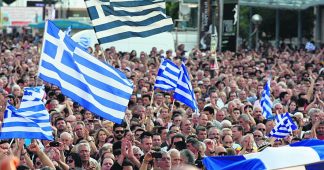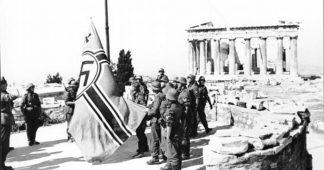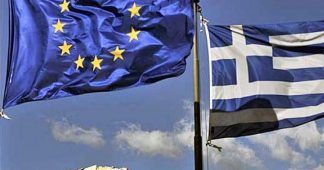Nov.19, 2019
Prologue
Greece, the wellspring of Western civilization, has a continuity of existence from ancient times to the present day. In spite of multiple depredations inflicted on the country over millennia, Greek ideas, science, discoveries and practices forming the foundations of Western culture, have persisted.
In this essay, the contours of Greek history are traced from the classical era to the present. Through thick and thin, the essential body of knowledge that defines Greece’s legacy, and Greece as a country, are preserved, sometimes underground for centuries, to emerge into the open during the Renaissance. Today, the ideas of ancient Greece continue to inform and illuminate current problems and prospects of modern life.
I hope that this essay reaches educated people who travel to Greece to see the ruins of ancient Greek civilization. I am urging them, including the Greeks in Greece, to return to our Hellenic political and cultural origins and traditions for the safeguarding of our democratic way of life – and even more than that — protect our Mother Earth.
This is not hyperbole. Anthropogenic climate change and toxic pollution are threatening life on Earth. Plato reported the Greeks thought of the Earth as the oldest of the gods.
Monotheism and modernity have abolished those gods. However, traditions springing from those gods continue. For example, The Olympics honored Zeus. The Athens Olympics in August 2004 was a dazzling celebration. Greece showed the world that the Olympics is Greek and must return to Greece for good. That way, the Olympics can continue exercising their civilizing influence.
The Greeks have dreamt the dream of life best
Learning about ancient Greece is a pilgrimage into the heart of Western Europe and North America. Every year several million tourists go to Greece to see the ancient ruins. The decision to go to Greece is a decision, in many instances, to improve oneself. The tourists should know enough history to put the Greek ruins into perspective, making it easier to fall in love with the land that made Western civilization possible.
I agree with the eighteenth-century German poet, Johann Wolfgang von Goethe, who wrote: “Of all peoples, the Greeks have dreamt the dream of life best.” (Quoted in R.W. Livingstone, Greek Ideals and Modern Life (1969, 43.)
Loss of Greek freedom
Greek history, however, is not a straightforward narrative of achievements. The Peloponnesian War in late fifth century BCE disrupted Greece. The meteoric rise and greatness of Alexander in late fourth century BCE spread Greek civilizations all over the world.
Greek political divisions made Greece vulnerable to its enemies. In 146 BCE, the Romans broke into Greece and brought democracy, freedom and science into eclipse. Then five and a half centuries later, the Roman emperor Constantine embraced Christianity as the religion of the Roman empire, including Greece.
That new religion, Christianity, hit Greece like a cataclysm: leveling the temples of the gods, burning the Alexandrian Library and other Greek libraries and schools, abolishing the Alexandria Mouseion: school of advanced studies, shutting down the Olympics, closing the Platonic Academy of Athens, and uprooting Hellenic / Greek culture.
The Western Roman empire fell to the barbarians in the fifth century of our era. But the Eastern part of the Roman empire that included Greece survived for more than a millennium. Scholars dub medieval Greece “Byzantium,” which obscures the continuity of Greek history and civilization.
Western Christians did not like or trust the Christian Greeks. They remembered Christian Greeks as descendants of the pagans who studied the natural world and the cosmos, and, in addition, the pagans who invented science and democracy. The ecclesiastical and theological Schism of 1054 exacerbated the divisions between East and West. It gave the Christians of the West an excuse for branding the Greeks heretic.
In 1204, on the way to a crusade against Moslems in Jerusalem, Venetians, French and Germans captured Constantinople, capital of medieval Greece. They dismembered the country, parceling out parts to themselves. That atrocity so massively weakened Greece over centuries that it prepared the ground for the Turkish conquest of Greece in 1453.
The Turkish occupation was the second cataclysm that deformed Greece. The Turks had no problem with Christianity. They used its clerics to govern their Christian subjects.
The Greeks suffered centuries of occupation from the Romans, the Christians, and the Turks. Of course, most of the Greeks had no option but becoming Christians.
The leaders of the Christian medieval Eastern Roman empire (Greece) were so obsessed about paganism (the many-gods piety of ancient Hellenes and their culture of science and freedom) that they practically forced the extinction of the very name of the Greeks: Hellenes. Forbidden to use their name, the Greeks started calling themselves Romans.
Despite such tyranny, enough Greeks remained Hellenes and attached to their ancient culture. They kept making copies of their literary and scientific inheritance. It was that written treasure that made possible the Arabic Renaissance in the eighth century and the Renaissance in Italy and Western Europe in the fifteenth century.
Education for freedom
After 1453, prosperous Greek merchants sent their sons to “Enlightened” Europe for education. Enough of those educated Greeks returned to their homeland where they built schools and started educating the children of peasants on the basics of Greek history and culture. This slow, laborious, and centuries-long effort connected the ancients and the moderns in Greece. By the beginnings of the nineteenth century, it sparked the Greek Revolution against the Turks.
The English poet Percy Bysshe Shelley was keenly aware of the transformation taking place in Greece. In 1821, the year of the outbreak of the Greek Revolution, he said:
“We are all Greeks. Our laws, our literature, our religion, our arts, have their root to Greece.” (The Complete Poems of Percy Bysshe Shelley, 1994, 501.)
Shelley was witnessing the heroic struggle of the Greeks to throw the Turks off their land. The moto of the revolutionaries was freedom or death. Shelley was one of dozens of philhellenes who fought with the Greeks against the Turks.
When the French and British, in alliance with the Turks, were fighting Russians in the Crimean War in the 1850s, the English newspaper, The Manchester Guardian, connected the Greek achievement to the Greeks’ passion for freedom. And that, the newspaper said, is why the Greeks matter:
“Why do we still read with undying interest the annals of that small Athenian state, whose whole free population never equaled that of the least of our metropolitan boroughs? Is it for the graceful verse of its tragedians, the rollicking wit of its comedians, or the glowing eloquence of its orators? Not a bit of it. All these treasures of literature are precious to us because they are the legacy and the inheritance of a freedom gained at fearful odds from mighty hosts. It is because each choric song and each tragic lay breathes of the spirit, which drew the sword at Marathon, and baffled the invader at Salamis. Each page of history tells us that it is only so long as a people retain the power of self-defense and the spirit of military resolution, that they can do these things for which the world will rank them among peaceful benefactors.” (Editorial, “Study the masters,” The Manchester Guardian, Dec. 19, 1855, reprinted, The Guardian, Oct. 16, 2004.)
Modern Greeks won their freedom and independence in 1828 “at fearful odds from mighty hosts.” The contrast between the well-armed forces of the Ottoman empire and the dispersed, often divided, and badly armed Greek rebels was startling. Greek revolutionaries usually got their weapons by killing Turkish soldiers.
The happy coincidence of the Greek passion for freedom, the perseverance in fighting the Turks for years against enormous odds and existential costs, made Greeks free. At the same time, philhellenes from Europe put the Greek Revolution on the European political agenda. Those philhellenes fought the Turks side by side with the Greeks.
The story of how the Greek Revolution happened and what the modern Greeks have done since winning political independence in 1828 makes up the substance of Greece: Biography of a Modern Nation by Roderick Beaton (University of Chicago Press, 2019).
Beaton taught modern Greek and medieval history and literature for thirty years at King’s College in London. His narrative starts in 1718 when the Austrian Habsburgs and the Ottoman Turks reached a tentative agreement of coexistence. Beaton brings his history to an end around 2015, with the latest existential confrontation between Greece and its Western allies: the European Union and the United States.
Beaton’s “story of Greece as a modern nation” or rather his “celebrity biography” of the country is well-written, lavishly illustrated, important, and timely.
Racist ideology
What is problematic is his rehashing of academic nonsense about modern Greeks: that, for instance, they are not really related to the ancient Greeks.
This racism against modern Greeks has always been part of the Western ideology about the Greeks. Christianity has been partly responsible for that racism. During the Greek War of Independence, for example, Western missionaries thought that the Greek church was evil.
John Hartley was a British missionary that mirrored the theological sentiments of Protestant Christians toward Greek Christians. In his 1831 book, Researches in Greece and the Levant, he spoke vociferously against the Orthodox church. His views reminded me of the fanaticism of the early Christians against Hellenes. He said:
“There is an infernal originality in apostate Christianity; it is the master effort of the Prince of Darkness. The Church of Christ becomes the synagogue of Satan. An attempt is made to combine light and darkness; to bring Heaven and Hell into monstrous and impossible coalition; to mingle the Hallelujahs of Paradise with the shrieks of the lost world; to place God and Satan conjointly on the throne of the universe.” (Quoted in That Greece Might Still Be Free by William St. Clair, 1972, 198.)
This theological hatred went hand in hand with the racism of the Westerners towards the Greeks trying to be free. Western politicians and those educated in the classics could not stomach that the largely impoverished “Orthodox Christian” Greeks had any relationship with the stars of Western civilization: men like Homer, Aeschylus, Sophocles, Euripides, Pericles, Socrates, Thucydides, Plato, Alexander the Great, Aristotle, Euclid, and Archimedes.
This contemptuous view of contemporary Greece gave license to looters. Lord Elgin, ambassador of England to the Sultan, was a racist robber of vast ambition. In early 1800s, he defaced the Parthenon, carrying the precious sculpture of 80-meter frieze to England, still in the British Museum in London. This outrageous theft has divided Greece and England for about 200 years.
Racism against the Greeks received a boost in the nineteenth century in the writings of Jacob Philipp Fallmerayer. In 1830, this Bavarian German propagandist claimed that no Hellenic blood flowed in the veins of Christian Greeks. In 1996, in his book Clash of Civilizations, the American political scientist Samuel Huntington reaffirmed the lies of Fallmerayer. He said, according to Beaton, that “Greece is not part of Western civilization.”
Beaton rejected the racism of Fallmerayer and Huntington, but he takes up national identity as a marker of division between ancient and modern Greeks. He argues that aside of the “affinity” modern Greeks have had for ancient Hellenes, there’s practically no evidence the citizens of modern Greece are related to the citizens of ancient Greece.
Beaton talks of the gap of missing centuries separating classical and modern Greeks. What happened during that vast time?
Hellenic survival
The situation was tough. Modern Greek historians closed that gap by digging into the history of medieval Hellenism: the Greeks continued speaking Greek; they continue with their Hellenic traditions of farming and food; they continued with their democratic traditions in the village; they never ceased resisting the enemy; they celebrated the birth of children, weddings and other major events with music, dancing and poetry; and they did their best in preserving their Hellenic inheritance.
For instance, in the twelfth century, a medieval Greek intellectual named John Tzetzes edited the Iliad of Homer for a gift to a foreign princess from Bavaria, Bertha von Sulzbach, becoming the wife of the Greek King Manuel I Komnenos. Tzetzes loved his Hellenic ancestors. He made a living as a writer. He was not alone. Constantinople had libraries full of ancient Greek works of science and literature.
In addition to this cultural continuity, very recent DNA studies find lots of genetic continuity between ancient and modern Greeks as well.
In August 2, 2017, the American journal, Science, reported that the “Greeks really do have near-mythical origins… living Greeks are indeed the descendants of Mycenaeans … [who] were closely related to the earlier Minoans… another great [Greek] civilization that flourished on the island of Crete from 2,600 BCE to 1,400 BCE.”
Beaton has additional problems with the names of places, and the names Greeks have been giving themselves and their children. He raises doubts about the Greekness of the modern inhabitants of Greece because they changed the names of some places from foreign to Greek and, second, giving their children more names of ancient Greek origin. He writes as if we can pick and choose our ancestors. We cannot. He also claims Greeks prefer calling themselves Romans rather than Hellenes. They don’t.
I grew up in Greece and I don’t remember ever hearing Greeks calling themselves Romans (Romioi). Romios (singular) does not carry “an emotional weight.” It never did. Only the violence of Christianity forced Hellenes to abandon their real name. When circumstances changed, as they did since the eighteenth century, the Greeks returned to their own identity and name. Hellenic names and icons grace Greek money and postage stamps.
In my family, all but one name, Regina, which is possibly of Latin origin, were ancient Greek names. We never had any doubt ancient Greeks were our ancestors. My grandmother, Demetra, had the name of goddess Demeter, probably the most important divinity in the Hellenic pantheon. My mother inherited a piece of land that belonged to her family for several centuries.
As for foreign toponyms, they were not that many. They were the product of Christian hatred for ancient Greek culture and foreign occupation. Christian churches were built on the ruins of Greek temples. The name of the saint replaced the name of the god. When Slavs occupied sections of Peloponnesos, they gave their names to the villages they occupied. The Turks, Venetians and other invaders did the same thing. But, in general, Greece did not change. For instance, a study of the names common in fourteenth-century Macedonia reveal the Greek character of Macedonia.
Aside from these metaphysical biases, circulating among fashionable academics and shared to some degree by Beaton, the intelligent reader will find that Beaton’s book still makes a great contribution to our understanding of modern Greece and Greeks. Beaton is right claiming that modern Greeks have been pioneers.
The Greek Revolution
The Greek Revolution was a result of the Greek passion for freedom. It was the first nationalist revolution in Europe. The Greek state was a nation state. Greece inspired Belgium, Italy, and the states of southeastern Europe in fighting for the establishment of their own national state.
The French Revolution inspired the Greeks of the Ionian Islands to dream of political independence and freedom. It also influenced the fathers of the Greek revolution.
The most influential of those Greek pioneers was Adamantios Koraes. A French-educated physician and great classical scholar from Smyrna, he worked in Paris and became the golden link between ancients and moderns in Greece. The inspiring and knowledge-packed books of Koraes included edited ancient Greek and Roman texts with extensive commentary on the importance of Greek wisdom, language, education, and science. These classical works filled his 17-volume Hellenic Library. Koraes edited some of the works of Homer, Hippocrates, Aristotle, Theophrastus, Plutarch, Isocrates, Heliodorus, Emperor Marcus Antoninus, Xenocrates and Galen. These works became textbooks in Greek schools and circulated widely among the Greeks in the crucial two decades before the Revolution of 1821.
Koraes never tired of reminding the Greeks they were the children of the ancient Greeks whose wisdom and science had built Paris and Enlightened Europe.
Koraes met Thomas Jefferson in Paris in the early 1820s. The two men exchanged political ideas valuable for rebuilding the rule of law and government in Greece.
But by 1821, France and the rest of Europe, just like today, had taken a vacation from the Greek-inspired Western civilization. European politicians had concocted a Holy Alliance to put down revolutionaries. They had more in common with Turks than the desperate Greeks fighting Turkish armies.
Beaton claims savagery took over the struggle between Greeks and Turks. “The story of the Greek Revolution,” he says, “is not one of rational actions and reactions. What happened was more like a real birth, or a cataclysm in nature.”
No doubt, both Greeks and Turks committed atrocities against each other. But the Turks had the upper hand. They purchased their arms and military training from Europe. In 1822, they utterly destroyed the island of Chios. They massacred most men and sold into slavery thousands of women and children. The massacre of Chios, says Beaton, “shocked the whole of Europe.”
The Turkish government even employed Egyptian armies to kill the Greek Revolution. Ibrahim, the Egyptian commander of those armies in Peloponnesos, was fighting a war of extermination. He planned to resettle Peloponnesos with Moslems from North Africa. The atrocities of his troops and the rumor of genocide and repopulating Peloponnesos with Moslems, finally, brought the European powers to their senses.
In the naval battle at the Bay of Navarino, in October 20, 1827, the allied navies of Russia, France and England destroyed the Egyptian and Turkish fleets. Beaton says, correctly, “Navarino changed everything.” The European powers decided Greece should be free.
Free Greece
The Greeks paid a horrendous price for their revolution. In the years 1821 to 1828, the country became desolate. Twenty percent of its population perished from massacres or starvation. Means of livelihood like “crops, flocks, mills and houses” suffered tremendous destruction, reaching 90 percent loss for livestock.
Independent Greece started with practically nothing. Hence, borrowing from the Europeans became routine.
The Europeans even sent Otto, son of the king of Bavaria Ludwig, to run the country. European influence was so pervasive in independent Greece that Greek political parties shamelessly shaped themselves after the interests of their patrons.
Yet the Greeks remained pioneers. In WWII, they won the first victory against the Hitler allies. They defeated the Italians in Albania. Not even this exceptional bravery sufficed in convincing the Western allies to rethink their cold attitude towards this small country at the heart of both civilization, geopolitics, and geography in Europe.
The result is continuing misunderstandings and unjust policies. In 1974, Britain and America gave permission to Turkey to invade and occupy half of the Greek island of Cyprus.
Germany, which almost destroyed Western civilization during WWII and nearly wiped out Greece in the early 1940s, is, once again, determining the future of Europe, especially that of Greece.
Greece owned money to the bankers of France, Germany and America. It could not pay back that money. Like the crusaders of 1204 and the debt humiliations of the 1840s, the gunboat blockade of Piraeus in 1850 and 1854, the European Central Bank and America’s International Monetary Fund, egged on and led by Germany, took over Greece, grinding the country and its people to a state of forced destitution – and lasting bitterness towards the West. This latest tragic and unethical financial “conquest” of Greece started in 2010 – with no end in sight.
Beaton is wrong saying Greece was a pioneer in putting up with this horrendous humiliation. To its eternal shame, the EU is no longer associated with Western civilization because it treated Greece like an enemy. Greece should have never given up its sovereignty and paid back that odious debt.
However, Beaton is right saying:
“I believe – indeed with passion – that Greece and the modern history of the Greek nation matter, far beyond the bounds of the worldwide Greek community.”
Read his book. He brings together lots of interesting insights from travelers’ accounts, official documents, and stories and poetry Greeks wrote about themselves, the Revolution, independence and politics. His explanation of why things happened the way they did is, for the most part, enlightening and absorbing.










